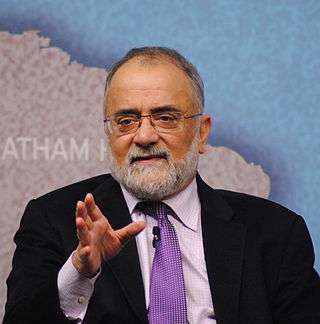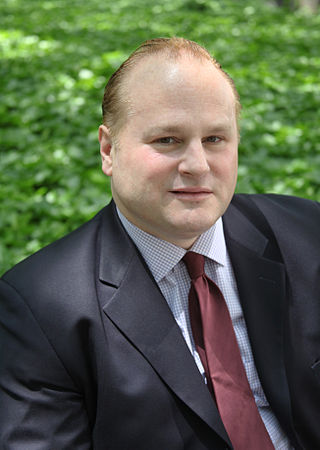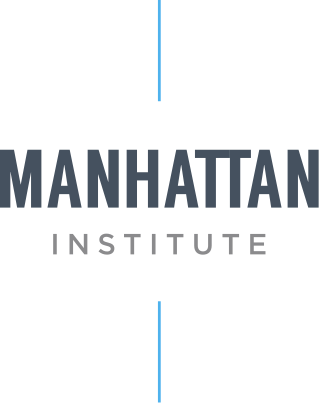
Milton Friedman was an American economist and statistician who received the 1976 Nobel Memorial Prize in Economic Sciences for his research on consumption analysis, monetary history and theory and the complexity of stabilization policy. With George Stigler, Friedman was among the intellectual leaders of the Chicago school of economics, a neoclassical school of economic thought associated with the work of the faculty at the University of Chicago that rejected Keynesianism in favor of monetarism until the mid-1970s, when it turned to new classical macroeconomics heavily based on the concept of rational expectations. Several students, young professors and academics who were recruited or mentored by Friedman at Chicago went on to become leading economists, including Gary Becker, Robert Fogel, and Robert Lucas Jr.
Cable-Satellite Public Affairs Network is an American cable and satellite television network, created in 1979 by the cable television industry as a nonprofit public service. It televises proceedings of the United States federal government and other public affairs programming. C-SPAN is a private, nonprofit organization funded by its cable and satellite affiliates. It does not have advertisements on any of its television networks or radio stations, nor does it solicit donations or pledges. The network operates independently; the cable industry and the U.S. Congress have no control over its programming content.

Thomas Loren Friedman is an American political commentator and author. He is a three-time Pulitzer Prize winner who is a weekly columnist for The New York Times. He has written extensively on foreign affairs, global trade, the Middle East, globalization, and environmental issues.
Radical centrism, also called the radical center, the radical centre, and the radical middle, is a concept that arose in Western nations in the late 20th century. The radical in the term refers to a willingness on the part of most radical centrists to call for fundamental reform of institutions. The centrism refers to a belief that genuine solutions require realism and pragmatism, not just idealism and emotion.

Ahmed Rashid is a Pakistani journalist and best-selling foreign policy author of several books about Afghanistan, Pakistan, and Central Asia.

Joshua Muravchik is a neoconservative political scholar. He resides in Washington, DC based World Affairs Institute, he is also an adjunct professor at the DC based Institute of World Politics and a former fellow at the Foreign Policy Institute of Johns Hopkins University’s School of Advanced International Studies (SAIS). He was formerly a fellow at the George W. Bush Institute (2012–2013), a resident scholar at the American Enterprise Institute (1987–2008), and a scholar in residence at the Washington Institute for Near East Policy (1985).

Gregg Edmund Easterbrook is an American writer and a contributing editor of both The New Republic and The Atlantic Monthly. He has authored ten books, and writes for op-ed pages, magazines, and journals.

James Bovard is an American libertarian author and lecturer whose political commentary targets examples of waste, failures, corruption, cronyism and abuses of power in government. He is a USA Today columnist and is a frequent contributor to The Hill. He is the author of Attention Deficit Democracy and nine other books. He has written for the New York Times, Wall Street Journal, Washington Post, New Republic, Reader's Digest, The American Conservative, and many other publications. His books have been translated into Spanish, Arabic, Japanese, and Korean.

Booknotes is an American television series on the C-SPAN network hosted by Brian Lamb, which originally aired from 1989 to 2004. The format of the show is a one-hour, one-on-one interview with a non-fiction author. The series was broadcast at 8 p.m. Eastern Time each Sunday night, and was the longest-running author interview program in U.S. broadcast history.
Richard Miniter is an investigative journalist and author whose articles have appeared in Politico, The New York Times, The Washington Times, The Washington Post, The Wall Street Journal, The Atlantic Monthly, Newsweek, The New Republic, National Review, PJ Media, and Reader’s Digest. A former editorial writer and columnist for The Wall Street Journal in Europe, as well as a member of the investigative reporting team of the Sunday Times of London, he is currently the National Security columnist for Forbes. He also authored three New York Times best-selling books, Losing bin Laden, Shadow War, Leading From Behind, and most recently Eyes On Target. In April 2014, Miniter was included by CSPAN's Brian Lamb in his book Sundays At Eight, as one of Lamb's top 40 book author interviews of the past 25 years for Miniter's investigative work on 9/11 mastermind Khalid Shaikh Mohammed.
Michael Mandelbaum is a professor and director of the American Foreign Policy program at the Johns Hopkins University, School of Advanced International Studies. He has written a number of books on American foreign policy and edited a dozen more.

Walter Russell Mead is an American academic. He is the James Clarke Chace Professor of Foreign Affairs and Humanities at Bard College and taught American foreign policy at Yale University. He was also the editor-at-large of The American Interest magazine. Mead is a columnist for The Wall Street Journal, a scholar at the Hudson Institute, and a book reviewer for Foreign Affairs, the quarterly foreign policy journal published by the Council on Foreign Relations.

When You Reach Me is a Newbery Medal-winning science fiction and mystery novel by Rebecca Stead, published in 2009. It takes place on the Upper West Side of New York during 1978 and 1979 and follows a sixth-grade girl named Miranda Sinclair. After Miranda finds a strange note, which is unsigned and addressed only to "M," in her school library book, a mystery is set into motion—one which Miranda ultimately must face alone. At the same time, Miranda juggles school, relationships with her peers, and helping her mom prepare to be on the game show The $20,000 Pyramid. Important characters in the story include Miranda's mother; Richard, her mom's good-natured boyfriend; Sal, Miranda's childhood best friend; and a homeless man who lives on Miranda's block and is referred to only as "the laughing man." Central themes in the novel include independence, redemption, and friendship.

Mallory Factor KCNG is an American pharmaceutical executive, professor, author, and media contributor. Factor is the founder and executive chairman of IntraBio Inc., a clinical-stage biopharmaceutical company based in Oxford, United Kingdom, which develops acetylleucine treatments for genetic and neurodegenerative diseases.

David Richard Henderson is a Canadian-born American economist and author who moved to the United States in 1972 and became a U.S. citizen in 1986, serving on President Ronald Reagan's Council of Economic Advisers from 1982 to 1984. A research fellow at Stanford University's Hoover Institution since 1990, he took a teaching position with the Naval Postgraduate School in Monterey, California in 1984, and is now an emeritus professor of economics.

Brian Patrick Lamb is an American journalist. He is the founder, executive chairman, and the now-retired CEO of C-SPAN, an American cable network that provides coverage of the U.S. House of Representatives and U.S. Senate as well as other public affairs events. In 2007, Lamb was awarded Presidential Medal of Freedom by President George W. Bush and received the National Humanities Medal the following year.

Michael Johns is an American conservative commentator, policy analyst, writer, a former speechwriter for President George H. W. Bush. He is a leader and spokesman in the Tea Party movement. He was also a health care executive.

Googled: The End of the World as We Know It is a book published in 2009 by American writer, journalist and media critic Ken Auletta. It examines the evolution of Google as a company, its philosophy, business ethics, future plans and impact on society, the world of business and the Internet.

The Manhattan Institute for Policy Research is an American conservative think tank focused on domestic policy and urban affairs. The institute's focus covers a wide variety of issues including healthcare, higher education, public housing, prisoner reentry, and policing. It was established in Manhattan in 1978 by Antony Fisher and William J. Casey.
Global arrogance is a term used colloquially to describe the cultural and economic hegemony of the United States over other countries. It differs from the concept of imperialism, in which one country physically occupies another.
















